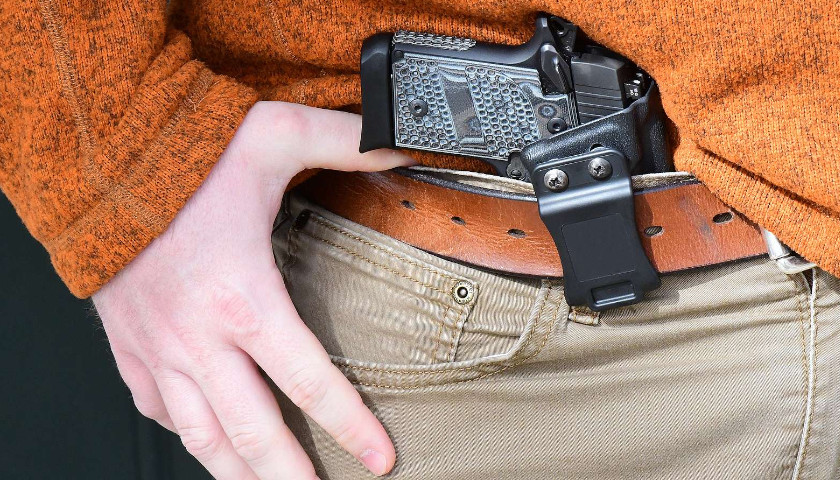By Natalia Castro
Ten years ago, the Supreme Court ruled that every American has a basic right to defend themselves. D.C. v. Heller affirmed the constitutional right granted in the Second Amendment to keep and bear arms not just for the purpose of creating a militia but also for basic protection for every individual. The case was viewed as monumental for the defense of the Second Amendment, but states have chosen to continually ignore the ruling and make gun ownership a nearly impossible task. As we celebrate the ten-year anniversary of the Court’s ruling, we must accept how far we have come and how far we still must go.
Before Heller, Washington, D.C. essentially banned handguns by making it a crime to carry an unregistered firearm and prohibiting the registration of handguns. D.C. also required residents to keep lawfully owned firearms unloaded and disassembled or bound by a trigger lock at all times. Heller, a D.C. special policeman who applied to register a handgun and was denied, filed a suit and the Supreme Court ruled in his favor.
The late Justice Antonin Scalia delivered the opinion of the Court in which he explained, “The handgun ban amounts to a prohibition of an entire class of ‘arms’ that is overwhelmingly chosen by American society for that lawful purpose. The prohibition extends, moreover, to the home, where the need for defense of self, family, and property is most acute. Under any of the standards of scrutiny that we have applied to enumerated constitutional rights, banning from the home ‘the most preferred firearm in the nation to ‘keep’ and use for protection of one’s home and family,’ would fail constitutional muster.”
Scalia added, “Undoubtedly some think that the Second Amendment is outmoded in a society where our standing army is the pride of our Nation, where well-trained police forces provide personal security, and where gun violence is a serious problem. That is perhaps debatable, but what is not debatable is that it is not the role of this Court to pronounce the Second Amendment extinct.”
Yet some states have taken it upon themselves to do exactly that, some states have made gun ownership so difficult, they are essentially pronouncing the Second Amendment extinct. Unfortunately, D.C., the exact place where the Heller case originated, is once again one of those areas.
In D.C., all firearms must be registered, firearm owners must obtain a gun license, no handguns can be sold or purchased within the district, the sale of rifles or shotguns can only be made through a licensed dealer in the district, ammunition may only be bought or sold according to the specification of the registered rifle or shotgun, no person is allowed to purchase ammunition for another weapon not specified with the gun permit, license, or registration and the list goes on and on.
A decade after the Heller decision and it is still nearly impossible to own a firearm in the district. And it is only getting worse.
Last year, D.C. officials announced they would not appeal a federal court ruling that struck down some of the district’s restrictive gun laws. The law in question required people to show “good reason to fear injury” in order to carry a handgun. Meaning individuals must somehow prove their life was in immediate danger in order to carry, despite the reality that our lives are often threatened without warning. Largely due to this law, only about 120 people in D.C. had a permit to carry a concealed handgun. The court ruled the law infringed on residents Second Amendment right to bear arms.
But D.C. officials did not refuse to appeal the case because of its clear unconstitutionality. In fact, the city’s attorney general argued, according to Fox5DC, “I continue to believe the District’s `good reason’ requirement is a common-sense, and constitutional, gun regulation. However, we must reckon with the fact that an adverse decision by the Supreme Court could have wide-ranging negative effects not just on District residents, but on the country as a whole.”
States like Maryland, New Jersey, and New York have similar “good reason” requirements on the books and by not appealing the decision, the D.C. officials allowed these laws to continue existing even if they cannot in D.C.
States like Connecticut have complex and timely processes on the books to dissuade residents from purchasing a firearm. For example, Connecticut gun laws dictate that residents must be 21 years old and receive an eligibility certificate from the Commissioner of Public Safety in order to apply to own a firearm. At which point there is a two-week waiting period. Once the application is approved, the resident must undergo an FBI background check, complete a safety course, and be fingerprinted. Even then, the eligibility certificate is only valid for five years.
By restricting and complicating the gun ownership process, states are making it impossible for Americans to do what the Heller decision allows us to do- defend ourselves.
In a March 2018 NBC News/ Wall Street Journal poll, nearly 60 percent of all Americans said gun ownership increases safety. States like Connecticut, California, and New York are directly infringing on their residents’ ability to feel safe, and it is unconstitutional.
Ten years after the Heller decision affirmed every American’s right to self-protection under the Second Amendment, we are still seeing the Amendment constantly challenged by states. It is clear while we have come a long way since nearly complete handgun bans, we have not come from enough. The fight to defend the Second Amendment is not over as long as gun control is permitted by the states.
– – –
Natalia Castro is a contributing editor at Americans for Limited Government.





